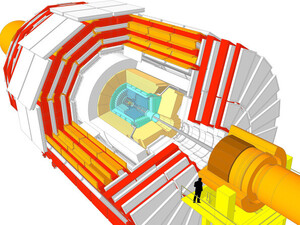BAM for Life Lab Foundation QuarkNet-India
Teachers:
-
BAM-LLFQNI 2021 will take place over one week with meetings/webinars on 27, 28, and 30 July.
-
Registration is through Life-Lab Foundation only.
Sections:
Small URL for this page: .
BAM Zoom Channel: http://cern.ch/go/tSG9 (requires password).
About BAM
The Big Analysis of Muons (BAM) is a project based on simplified LHC masterclasses in two flavors: ATLAS and CMS. We will use the CMS version for BAM-LLFQNI 2021. Each retains most of the interesting parts of the corresponding masterclass used in International Masterclasses (IMC) but is simple enough to explain to students via screencasts, text, and online discussion. BAM has two purposes: to give students a meaningful masterclass experience while studying at home and reach students and teachers who might not ordinarily participate in IMC using online tools.
Student Pages
CMS
Timeline and Progress for July 2021
|
Tue 27 July (1 hr 15 min) LLFQNI Session #8 |
Wed 28 July (2 hr) LLFQNI Session #9 |
Fri 30 July (1 hr 30 min) LLFQNI Session #10 |
|
Particle Physics and CMS webinar 18:30 IST, 15:00 CET, 09:00 U.S. ET CMS and the Standard Model (A. Sharma) (slides) Q&A |
Student and teacher webinar 18:30 IST, 15:00 CET, 09:00 U.S. ET Introduction to CMS measurement (M. Wadness, J. Wegner) (slides) Begin data analysis; Q&A (Session #9 video - partial - started late) |
Student data analysis must end one hour prior to 18:30 IST, 15:00 CET, 09:00 U.S. ET Discussion of results Q&A |
|
Homework: Watch screencasts in BAMC page. |
Homework: Complete data analysis at home |
Times may be converted to other zones using the online time zone converter.

How it works
- Contact your students who might want to participate in an online masterclass and register by Friday 18 June. (Registration is now closed.)
- We will have a a Teacher Q&A videoconferences on the BAM Zoom Channel on Fri 18 June. Further information on Zoom can be found on this page. (Ignore the parts about ATLAS or MINERvA - they are for different masterclasses.)
- At your discretion, you can offer prep activities that work via remote learning. Suggestions are below. Rolling with Rutherford and The Particle Adventure are especially recommended. Both can be done online.
- Study the CMS student pages and then send your students there to learn what they will do in the masterclass. These include screencasts to cover all aspects of BAMC that students need on that page along with the text.
- Datasets will be available on the BAM Data Assignments page. Each data file should have two students assigned to it. Students should collaborate online so they can work together on the analysis. Students are expected to facilitate their own commication in pairs but the teacher can also assign school-provided online tools. If neither is a good option, please contact Ken or Mike for help.
- Have your own videoconference with your students who are interested in participating to explain BAM and point out resources like the Student Prep activities below and the CMS page. Stress that students need to watch the screencasts on their student page to understand how to do the measurement.
- A talk on the Standard Model and the experiment they will study will be available for students on Tuesday 27 July, at 17:00 IST. Student connections will be carried in special Zoom webinars. We may need to place limits on the number of students each teacher can bring. We will keep you informed about this.
- Student data analysis can be started once you think your students are ready. Often, students start after the talk. Please work out the logistics with them and be available for their questions.
- The masterclass videoconference will take place on Friday 30 July as a Zoom webinar.
- All videoconferences and webinars are password-protected. You will get a password to log in which you can share with your students.
- Advice from teachers on all of the above is very valuable. Please contact Archana, Shane, or Ken with questions, concerns, and ideas.
Student Prep
There are several activities that students can do at home from the QuarkNet Data Activities Portfolio that will help. You can assign or suggest some of these to help them prepare. They have each have comments on how to extend them for study at home, where needed. They are:
- Histograms: The Basics - main page - no extension needed
- Dice, Histograms, and Probability - main page - extension comment
- Rolling with Rutherford - main page - extension comment
- Calculate the Z Mass - main page - extension comments
In addition, we suggest The Particle Adventure for an overview of particle physics and, for further study, the videos by Don Lincoln on Fermilab YouTube Channel.
Resources
- ATLAS slides
- CMS slides
- Resources from BAM-CMS in 2020
- BAM Video Extras
- Don Lincoln webinar (description) (recording part 1) (recording part 2)

